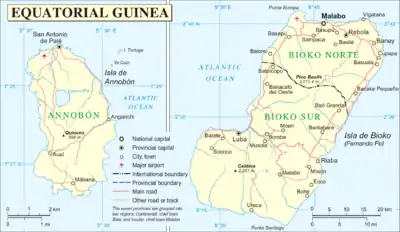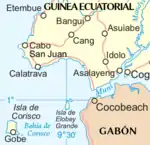Insular Region (Equatorial Guinea)
The Insular Region of Equatorial Guinea (Spanish: Región Insular de Guinea Ecuatorial, French: Région insulaire de Guinée équatoriale, Portuguese: Região Insular da Guiné Equatorial) comprises the former Spanish territory of Fernando Po, together with Annobón island, the latter formerly part of the Spanish territory of Elobey, Annobón and Corisco, which was located in the Gulf of Guinea and in the Corisco Bay.

The region covers 2,052 km2 and has a population of 340,362 in 2015. It is split into three political jurisdictions:
The islands located in Corisco Bay are not part of the Insular Region but are included in the Litoral Province which is part of Continental Region (Litoral Province).
The largest city, Malabo, is the national and regional administrative capital. The other main cities are Luba, Riaba, Rebola, Baney, and San Antonio de Palé.
Bioko Bioko Island was known as "Fernando Po" until the 1970s. It is located about 40 km away from Cameroon and is the largest island of the Gulf of Guinea, covering 2,017 km2.
Annobón With just 17 km2, this small volcanic island is the most remote territory of the Republic of Equatorial Guinea. It is located 670 km away from Malabo and 580 km away from Bata, and is south of the equator. Between Annobón and Bioko are located the sovereign state of São Tomé and Príncipe.

Corisco Corisco is located 25 km away from the Río Muni estuary. Its surface is about 15 km2 and has a population of 150. Corisco is the home of the Benga people. Due to the legendary beauty of Benga women, for long time this island was known as "Isla del Amor" (Love island). Most of the inhabitants are "mestizos".
Elobey Grande and Elobey Chico Situated at the mouth of the Río Muni, just 10 km away from Gabon. The surface area of both of these islands is just about 2.46 km2. "Elobey Grande" is sparsely inhabited, the main settlement being the village of M’Belobi. "Elobey Chico" is smaller, now uninhabited but once the colonial capital of the Río Muni. Both Elobeys are part of the municipality of Corisco.